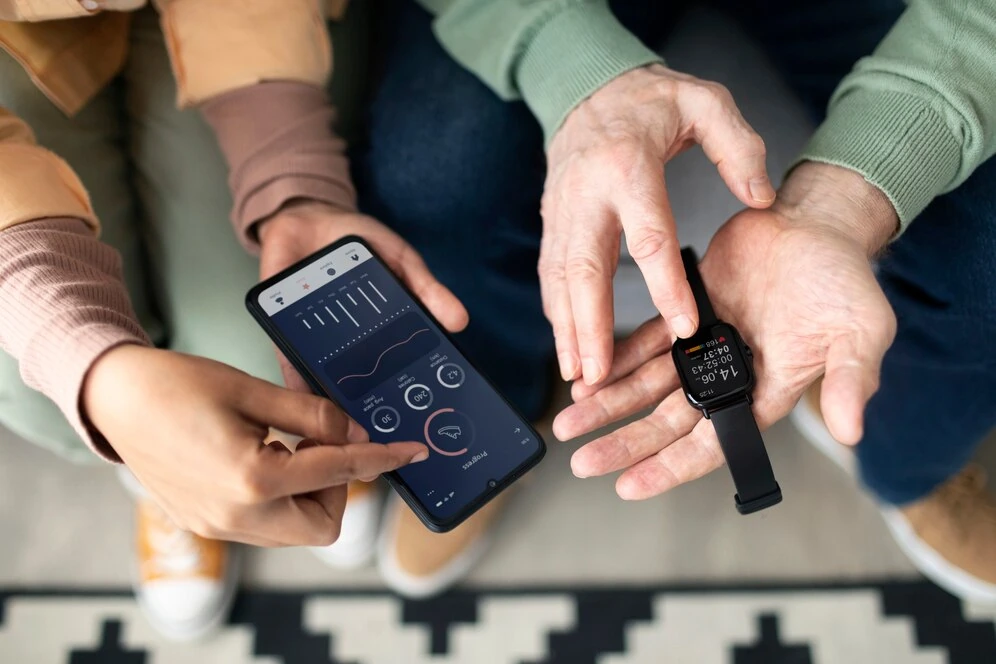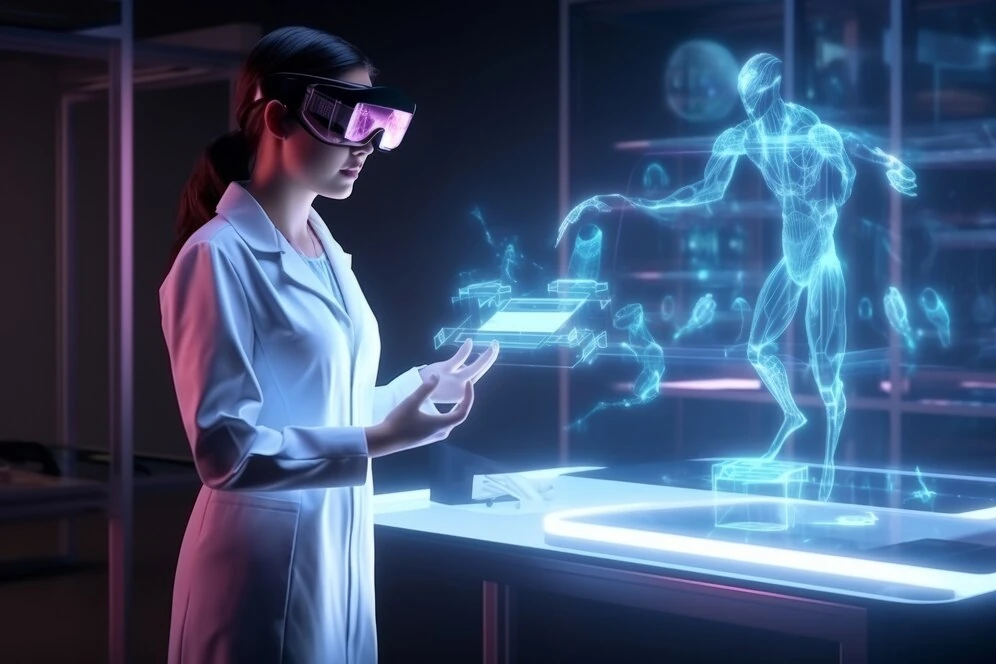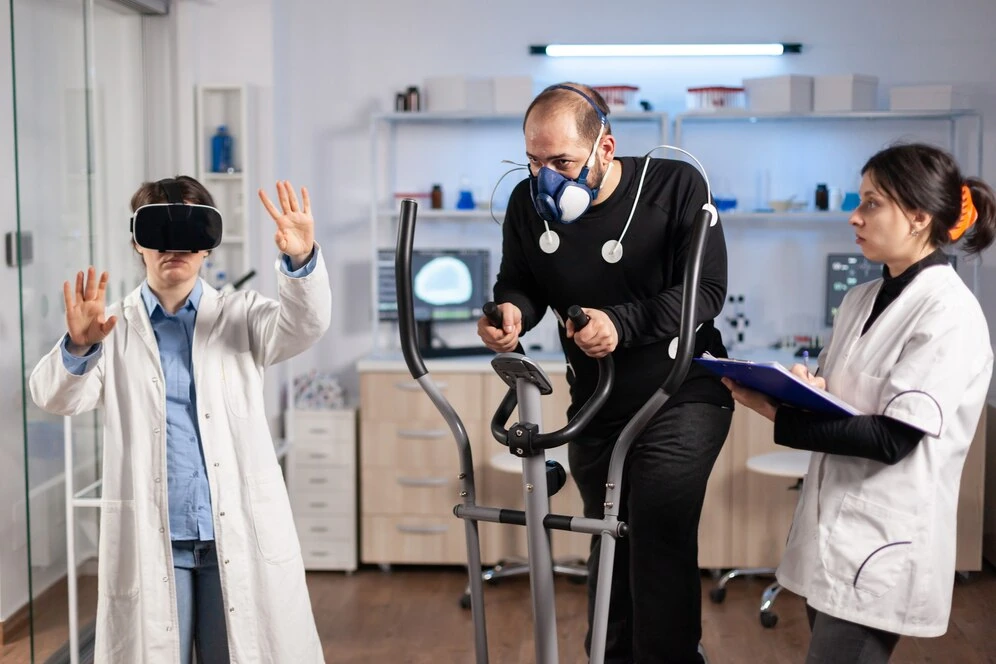Smart technology is reshaping healthcare in profound ways, bringing better patient outcomes and more efficient medical systems. From AI-powered diagnostics to remote monitoring devices, these advances are creating a healthcare landscape that’s more connected, precise, and centered on patient needs.
The Evolution of Smart Hospitals

Smart hospitals combine advanced technology with traditional healthcare facilities to improve every aspect of medical care. According to a Delphi study in PubMed Central, healthcare experts agree that smart hospitals will become the standard model for healthcare delivery within the next decade.
Dr. Lozovatsky, a healthcare technology researcher, explains: “Smart hospitals integrate various technologies to create a seamless ecosystem where data flows efficiently between departments, enabling better decision-making and improved patient care.”
Advanced Patient Monitoring Systems
Modern healthcare now uses sophisticated systems that continuously track vital signs and other health data in real time. These systems alert medical staff to potential issues before they become emergencies, allowing for preventive rather than reactive care.
Wearable devices integrated into hospital monitoring protocols let patients move freely while maintaining continuous monitoring. This advancement makes the patient experience better while giving healthcare providers valuable data to inform treatment plans.
AI-Powered Diagnostic Tools
Artificial intelligence has changed how diagnoses happen. Machine learning algorithms can analyze medical data, including imaging results, often detecting small details that even experienced physicians might miss.
A Google Scholar analysis found that AI-assisted diagnoses show equal or better accuracy compared to human diagnostics in several specialties. This technology doesn’t replace healthcare professionals—it gives them better tools to make informed decisions about patient care.
Smart Management Systems for Better Operations
Healthcare organizations need to improve efficiency while maintaining quality care. Smart technology systems help by improving everything from patient flow to resource allocation.
Predictive analytics tools look at past data to forecast patient admission rates, helping hospitals manage staff levels appropriately. Automated inventory management systems ensure medical supplies are available when needed, reducing waste and preventing shortages.
Telemedicine: Healthcare Access for Everyone

Telemedicine represents one of the biggest changes in modern healthcare. It has expanded access to medical services for patients in remote areas or those who have trouble moving around.
Studies in PubMed show that telemedicine consultations can produce health outcomes similar to in-person visits for many conditions. Virtual appointments also improve patient engagement since people are more likely to seek medical advice when it’s easier to access.
“Telemedicine has fundamentally changed the way we think about healthcare delivery,” notes a consensus statement from healthcare experts published in an AMA journal. “It’s not just about convenience—it’s about creating a more equitable healthcare system where geography doesn’t determine access to quality care.”
Wearable Devices and Remote Patient Monitoring

Consumer health technology has created new opportunities for continuous monitoring and preventive care outside traditional healthcare settings. Wearables that track heart rate, activity, sleep patterns, and other health metrics give both patients and healthcare providers valuable insights.
Remote patient monitoring systems allow medical professionals to track patients’ health data between appointments, enabling early intervention when concerning trends appear. This approach works particularly well for managing chronic conditions, where small changes in health metrics might signal the need for treatment adjustments.
A study examining the impact of remote patient monitoring found that this technology significantly reduces hospital readmission rates for patients with chronic conditions like heart failure and diabetes. The continuous data stream allows for timely interventions before complications require emergency care.
Big Data Analytics: Better Healthcare Decisions

Healthcare organizations now generate huge volumes of data through electronic health records, medical devices, insurance claims, and other sources. Big data analytics tools help make sense of this information, creating useful insights that can improve both individual patient care and community health management.
Predictive Analytics in Patient Care
Predictive analytics uses historical data to identify patients at higher risk for specific health problems. For example, algorithms can analyze data patterns to determine which patients might likely develop complications after surgery or which might benefit from more intensive preventive measures.
“The power of predictive analytics lies in its ability to help us allocate resources more effectively,” explains a healthcare data analytics expert. “By identifying high-risk patients early, we can implement targeted interventions that improve outcomes while reducing the overall cost of care.”
Population Health Management
Smart technology enables healthcare systems to address the health needs of entire communities, not just individual patients. Data analytics tools can identify trends in disease prevalence, treatment effectiveness, and social factors affecting health, which inform public health initiatives and prevention strategies.
A comprehensive study published in Google Scholar showed that healthcare organizations using data-driven population health management programs achieved measurable improvements in community health metrics while reducing healthcare spending.
Artificial Intelligence: The Foundation of Smart Healthcare

Artificial intelligence has entered virtually every part of healthcare, from administrative functions to clinical decision support. Machine learning algorithms get better as they process more data, making AI systems increasingly valuable tools for healthcare providers.
Clinical Decision Support
AI-powered clinical decision support systems analyze patient data against vast medical knowledge bases, helping healthcare professionals make better treatment decisions. These systems can suggest possible diagnoses, recommend appropriate tests, and flag potential medication interactions.
Research in PubMed Central indicates that physicians using AI-powered decision support tools show improved diagnostic accuracy, particularly for complex or rare conditions. These systems serve as valuable “second opinions,” helping healthcare providers consider possibilities they might otherwise miss.
Medical Education and Training
Smart technology is also changing how future healthcare professionals learn and develop skills. Virtual reality simulations allow medical students to practice complex procedures in safe environments, while AI-powered educational tools adapt to individual learning styles.
“The integration of artificial intelligence into medical education represents a major shift in how we prepare healthcare professionals,” notes a leading medical educator. “These technologies allow for more personalized, efficient learning experiences that better prepare students for real-world clinical practice.”
Personalized Medicine: Custom Treatment Plans

Perhaps the most significant impact of smart technology in healthcare is the advancement of personalized medicine—treatments tailored to individual patients based on their genetic makeup, lifestyle factors, and health history.
Precision medicine approaches use vast amounts of data to determine which interventions will most likely benefit specific patients. This differs greatly from traditional “one-size-fits-all” treatment protocols that might work for the average patient but don’t address individual differences.
A medical journal analysis found that personalized treatment plans guided by AI analysis of patient data produced significantly better outcomes for several conditions, including certain cancers and autoimmune disorders. These approaches minimize treatment invasiveness while maximizing effectiveness.
Challenges in Smart Healthcare Implementation

Despite its potential, integrating smart technology into healthcare systems presents significant challenges that must be addressed.
Data Security and Privacy Concerns
As healthcare organizations collect and store increasing amounts of sensitive patient data, ensuring adequate security and privacy protections becomes critical. Strong encryption, access controls, and compliance with regulations like HIPAA are essential components of responsible healthcare technology implementation.
Equal Access to Technology-Enhanced Care
There’s a risk that technological advances could worsen existing disparities in healthcare access if not implemented thoughtfully. Healthcare organizations must work to ensure that smart technology benefits all patient groups, including those in underserved communities or with limited technology skills.
Integration with Existing Systems
Many healthcare facilities struggle to integrate new smart technologies with older systems. Achieving compatibility between different platforms and ensuring smooth data exchange remains a significant challenge for many organizations.
Sustainable Practices in Smart Healthcare

An emerging focus in smart healthcare development is the integration of green technologies and sustainable practices. Energy-efficient systems, eco-friendly building materials, and reduced resource consumption are becoming important considerations in smart hospital design.
A scenario-building exercise conducted with healthcare facilities managers identified several ways smart technology can reduce energy consumption in hospitals, including automated lighting and climate control systems that adjust based on occupancy levels. These innovations not only reduce operational costs but also support environmental sustainability goals.
Emerging Trends in Smart Healthcare

Looking ahead, several trends suggest the continued evolution of smart technology in healthcare:
Robotic Surgery and Automated Procedures
Advances in robotics technology are enabling increasingly precise surgical procedures with minimal invasiveness. These systems extend surgeons’ capabilities while reducing patient recovery times and post-operative complications.
Blockchain for Secure Health Data Management
Blockchain technology offers promising solutions for secure, transparent management of health data. This approach could enable safer sharing of medical information between healthcare providers while giving patients greater control over their personal health records.
Ambient Clinical Intelligence
Future smart hospitals may incorporate ambient intelligence systems that automatically document patient encounters, eliminating the need for manual record-keeping and allowing healthcare professionals to focus more fully on patient interactions.
Frequently Asked Questions About Smart Healthcare Technology
What is smart healthcare technology?
Smart healthcare technology refers to the integration of advanced digital solutions, artificial intelligence, Internet of Things (IoT) devices, and data analytics into healthcare systems to improve patient care, operational efficiency, and health outcomes. These technologies enable real-time monitoring, data-driven decision making, and personalized treatment approaches.
How is artificial intelligence changing healthcare?
Artificial intelligence is transforming healthcare through improved diagnostic accuracy, personalized treatment recommendations, administrative automation, and predictive analytics. AI algorithms can analyze vast amounts of medical data to identify patterns and insights that might not be apparent to human practitioners, leading to earlier disease detection and more effective treatment plans.
What are the benefits of wearable devices in healthcare?
Wearable devices provide continuous health monitoring, enabling early detection of potential health issues and more comprehensive data for healthcare providers. They help patients take an active role in their health management, improve medication adherence, and enable remote patient monitoring. For healthcare providers, wearables offer real-time data on patient vital signs and activity levels between appointments.
How does telemedicine improve healthcare access?
Telemedicine improves healthcare access by eliminating geographical barriers, reducing travel time and costs for patients, enabling care for those with mobility limitations, and decreasing wait times for appointments. It also allows specialists to serve patients in rural or underserved areas who might otherwise lack access to specialized care.
What challenges does smart healthcare technology face?
Major challenges include ensuring data security and patient privacy, addressing healthcare disparities and digital divides, integrating new technologies with existing systems, training healthcare professionals to use new tools effectively, navigating complex regulatory environments, and managing the costs associated with implementing advanced technologies.
How does smart technology improve patient outcomes?
Smart technology improves patient outcomes through earlier disease detection, more accurate diagnoses, personalized treatment plans, continuous monitoring that enables timely interventions, improved medication management, enhanced coordination between healthcare providers, and increased patient engagement in their own health management.
What role does big data play in smart healthcare?
Big data analytics in healthcare enables predictive modeling for early disease detection, population health management, resource optimization in healthcare facilities, identification of treatment effectiveness patterns, and faster medical research. By analyzing vast amounts of diverse health data, providers can make more informed decisions about individual and community health needs.
How are smart hospitals different from traditional hospitals?
Smart hospitals differ from traditional hospitals through their integration of IoT devices for continuous monitoring, AI-powered diagnostic and decision support systems, automated operational systems, digitized patient records accessible across departments, predictive maintenance of medical equipment, and enhanced security through digital technologies. These features create more efficient, responsive healthcare environments.
What is the future of smart healthcare technology?
The future of smart healthcare includes expanded use of robotics in surgery and patient care, more sophisticated AI diagnostic tools, ambient clinical intelligence systems, blockchain for secure health data management, increased use of virtual and augmented reality in medical education and treatment, and greater integration of genomics with AI for truly personalized medicine.
How can patients benefit from healthcare data analytics?
Patients benefit from healthcare data analytics through more personalized treatment plans, reduced medical errors, improved preventive care recommendations, faster diagnoses, more convenient healthcare experiences, better chronic disease management, and increased transparency about treatment options and outcomes.
A Patient-Centered Technology Shift in Healthcare
The integration of smart technology into healthcare represents more than just technical progress—it signifies a fundamental shift toward more patient-centered, efficient, and effective care models. As artificial intelligence, IoT devices, and data analytics capabilities continue to advance, healthcare delivery will become increasingly personalized, accessible, and focused on outcomes.
Successfully implementing these technologies requires thoughtful collaboration between technology developers, healthcare providers, policy makers, and patients. By addressing challenges related to implementation, ethics, and access, we can ensure that smart healthcare technology creates a better healthcare system for everyone.
As this technological shift continues, maintaining focus on the ultimate goal—improving patient care and outcomes—remains essential. Smart technology should serve as a powerful tool for advancing the fundamental mission of healthcare: promoting health, preventing disease, and providing compassionate care to those in need.

